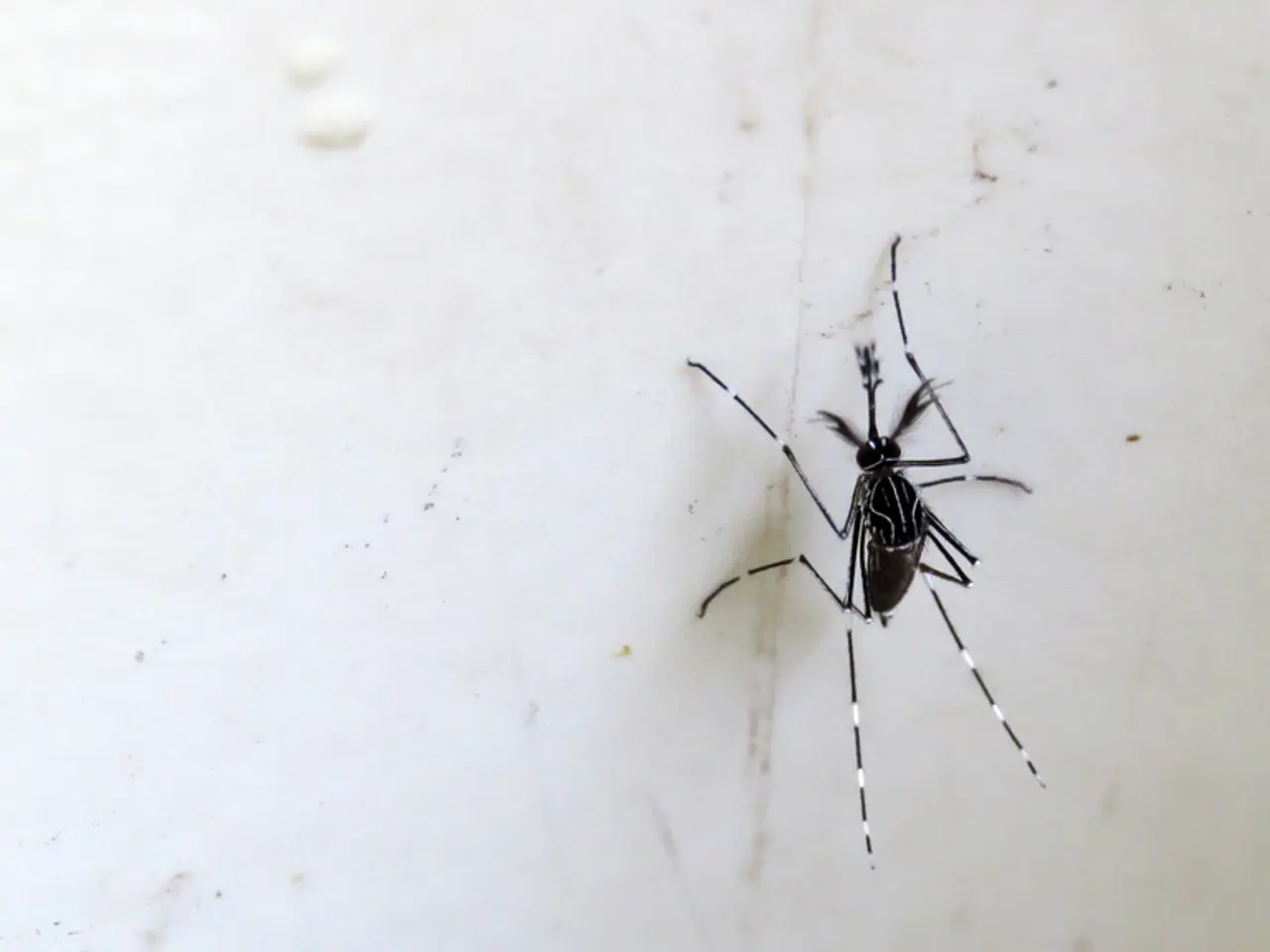Is it necessary for Swiss citizens to be concerned about the chikungunya virus?
In recent years, the spread of the Chikungunya virus has become a significant health concern, with outbreaks reported in multiple global regions. The World Health Organization (WHO) has issued a warning, urging countries to prepare for the virus, which now threatens populations in 119 countries and puts 5.6 billion people at risk.
The Indian Ocean islands, such as Reunion, have seen major outbreaks, threatening large portions of their populations. In China, particularly in the southern province of Guangdong and the city of Foshan, thousands of local cases have been confirmed following imported infections, with local transmission fueled by Aedes mosquitoes.
The Chikungunya virus is transmitted by the yellow fever mosquito, Aedes aegypti, and the Asian tiger mosquito, Aedes albopictus, which also spread dengue and Zika viruses. These mosquitoes are expanding their range, partly due to climate change, and are reaching Europe and Switzerland via transport links due to global trade, travel, and climate change.
Symptoms of the virus typically manifest as a sudden rise in high fever, severe joint pain, and headaches. In many cases, an infection causes no or only very mild symptoms. However, the joint pain caused by Chikungunya can be very severe and may last for months or even years, although most people recover within a week.
In Switzerland, 30 Chikungunya infections have been seen among travellers returning this year, which is more than double the number in the same period last year. There has been a case of Chikungunya virus transmission near the Swiss border, around 100 kilometres from Basel.
The best protection against Chikungunya is to avoid being bitten. This can be achieved by using insect repellents, wearing long-sleeved tops and trousers, and reducing tiger mosquito breeding grounds. The Swiss government has been monitoring the mosquito since 2013.
The WHO emphasizes urgent preventive actions such as mosquito control and personal protection to reduce virus spread. In light of the growing global footprint of Chikungunya, international vigilance and response are necessary to combat this virus and protect the global population.
[1] World Health Organization. (2025). Chikungunya virus outbreak in 2025: A global concern. Retrieved from https://www.who.int/news/item/2025-chikungunya-virus-outbreak-in-2025-a-global-concern
[2] Centers for Disease Control and Prevention. (2025). Chikungunya virus outbreak in 2025: A global concern. Retrieved from https://www.cdc.gov/chikungunya/outbreaks/2025-outbreak.html
[3] European Centre for Disease Prevention and Control. (2025). Chikungunya virus outbreak in 2025: A global concern. Retrieved from https://www.ecdc.europa.eu/en/chikungunya-virus-outbreak-2025
[4] World Health Organization. (2025). Chikungunya virus: Global distribution and risk. Retrieved from https://www.who.int/news-room/fact-sheets/detail/chikungunya-virus
- Science advances in the field of environmental science are crucial to understanding the expansion of mosquito ranges due to climate change.
- The manufacturing industry needs to address workplace-wellness concerns as chronic diseases like Chikungunya continue to spread.
- The increasing global presence of medical-conditions such as Chikungunya requires more investments in therapies and treatments for effective management.
- Cancer research and medicine are also relevant in the context of Chikungunya, as chronic joint pain can impact patients' quality of life.
- Respiratory conditions may not be directly linked to Chikungunya, but managing general health becomes all the more important in the face of such emerging diseases.
- Digestive health plays an essential role in the body's ability to fight off pathogens, including those that cause Chikungunya.
- Eye-health and hearing are often overlooked areas when it comes to health and wellness, but they can be affected by various medical-conditions, including Chikungunya.
- Fitness and exercise not only improve overall health but also boost the immune system, potentially minimizing the impact of Chikungunya and other viruses.
- Sexual health is a vital aspect of personal health, and understanding its relationship with Chikungunya can help in developing preventive measures.
- Autoimmune disorders can make individuals more susceptible to Chikungunya and its painful joint complications.
- Climate change, a significant driver of Chikungunya's geographical expansion, is also linked to an array of other environmental issues.
- In the realm of processing and manufacturing, clean energy solutions can help reduce the spread of diseases like Chikungunya by limiting the proliferation of mosquitoes.
- Mental-health issues, such as anxiety and depression, can arise from the fear of diseases like Chikungunya and should be addressed through adequate support systems.
- Men's health should not be disregarded in the context of Chikungunya, as the virus can potentially impact all genders equally.
- Skin-care products can serve as an additional layer of protection against insect bites, acting as a preventive measure against diseases like Chikungunya.
- Nutrition plays a crucial role in bolstering the immune system, making it more resilient to infections like Chikungunya.
- Aging population demographics require special attention in managing health risks, including those posed by Chikungunya and other chronic diseases.
- Women's health, including pregnancy and childbirth, is a critical area to consider in cases where Chikungunya infection is possible.
- Parenting can present unique challenges when dealing with health scares like the Chikungunya virus, necessitating educational resources and support networks.
- Weight management is essential for maintaining good overall health, reducing the risk of multiple health issues, including Chikungunya.
- Cardiovascular health is interconnected with the immune system, suggesting that maintaining heart health may aid in fighting off diseases like Chikungunya.
- The healthcare industry should prioritize industry-wide policies that create a culture of awareness and response to health crises like Chikungunya.
- Medicare and other health insurance programs should be flexible and responsive to accommodate complex health issues and expenses related to Chikungunya.
- The potential therapeutic benefits of CBD in managing chronic pain and inflammation associated with Chikungunya warrant further investigation.
- Neurological disorders like multiple sclerosis and Parkinson's disease can weaken the immune system, making patients more vulnerable to Chikungunya and its complications.
- Environmental science, finance, energy, aerospace, retail, entrepreneurship, transportation, leadership, diversity and inclusion, small business, investing, real estate, stock market, private equity, and even budgtiging and debt management are all interconnected in the larger effort to combat Chikungunya and other global health concerns.
- In order to stay informed and protect ourselves and our families, we must remain vigilant, stay updated on Chikungunya news and resources, and take appropriate measures to minimize exposure to the virus.








